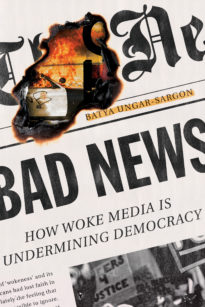Is Batya Ungar-Sargon truly the voice of journalistic integrity in today's polarized media landscape? The answer lies in her bold commitment to challenging woke media narratives and exposing biases that undermine democracy. Her work as a journalist, author, and cultural commentator has sparked intense debates across the political spectrum, making her one of the most influential voices in contemporary journalism.
Batya Ungar-Sargon's journey through the complex world of modern media began with her tenure at The Forward, where she served as opinion editor before transitioning to Newsweek as deputy opinion editor. Her ability to navigate sensitive topics such as Israel-Palestine relations, cultural warfare, and media bias has positioned her as a critical thinker who refuses to conform to popular narratives. In her podcast appearances, including those with Quillette's Jonathan Kay, she consistently demonstrates an analytical approach that separates fact from fiction while addressing controversial issues like genocide accusations against Israeli policies or working-class struggles in America.
| Personal Information | Details |
|---|---|
| Name | Batya Ungar-Sargon |
| Date of Birth | March 12, 1983 |
| Place of Birth | New York City, USA |
| Spouse | Divorced |
| Profession | Journalist, Author |
| Notable Works | Bad News: How Woke Media Is Undermining Democracy, Second Class: How The Elites Betrayed America's Working Men And Women |
| Affiliations | Newsweek (Deputy Opinion Editor), The Free Press (Columnist) |
| Reference | Wikipedia |
Her book Bad News: How Woke Media Is Undermining Democracy delves deep into the mechanisms by which progressive media outlets manipulate public perception through selective reporting and ideological bias. Ungar-Sargon argues that this trend not only distorts reality but also erodes trust in democratic institutions. Through meticulous research and compelling case studies, she illustrates how mainstream media organizations prioritize social justice agendas over objective journalism, ultimately weakening the very fabric of democratic discourse.
In another significant work, Second Class: How The Elites Betrayed America's Working Men And Women, Batya Ungar-Sargon explores the widening gap between elite classes and working Americans. Drawing from personal experiences—her husband's career in trade work serves as a poignant example—she highlights the systemic disrespect faced by blue-collar workers within American society. This publication resonated deeply with many readers who identified with its portrayal of economic disparity and cultural elitism.
Ungar-Sargon's commentary extends beyond written works; her appearances on various platforms reinforce her stance against biased media coverage. For instance, during discussions about Zei Squirrel's parody thread concerning alleged incidents involving her ex-husband, she navigates complex legal and ethical boundaries while maintaining journalistic integrity. Such instances underscore her dedication to presenting balanced perspectives even when confronted with potentially incendiary material.
Her association with The Free Press further solidifies her reputation as a champion of traditional journalistic values amidst evolving digital landscapes. As columnist Bari Weiss notes, this platform embodies principles once considered foundational to American journalism—truthfulness, fairness, and accountability. Through contributions here, Batya continues advocating for these ideals despite mounting pressures from both sides of the political divide.
While Batya Ungar-Sargon remains focused on addressing pressing social issues through rigorous analysis and thoughtful critique, her influence extends far beyond mere words on paper or screen. By challenging prevailing norms within media industries and fostering meaningful conversations around contentious subjects, she plays an instrumental role in shaping future directions for journalism itself—a field increasingly defined by rapid technological advancements and shifting audience expectations.
As we consider Batya Ungar-Sargon's contributions thus far, it becomes evident that her impact will continue shaping how information is disseminated and perceived well into the future. Whether tackling politically charged topics related to Israel-Palestine relations or shedding light on overlooked socioeconomic challenges facing ordinary citizens, her unwavering commitment to truth ensures that important stories receive proper attention without succumbing to partisan pressures.
In conclusion, Batya Ungar-Sargon represents much more than just another voice among countless others vying for recognition within today's crowded media environment. Through exceptional insight, courage, and perseverance, she stands out as someone genuinely committed to upholding core tenets of quality journalism regardless of external influences attempting to steer narratives elsewhere. As audiences worldwide seek reliable sources capable of cutting through noise created by sensationalism-driven outlets, figures like Batya provide hope that authentic reporting still holds value—and can indeed prevail against all odds.



